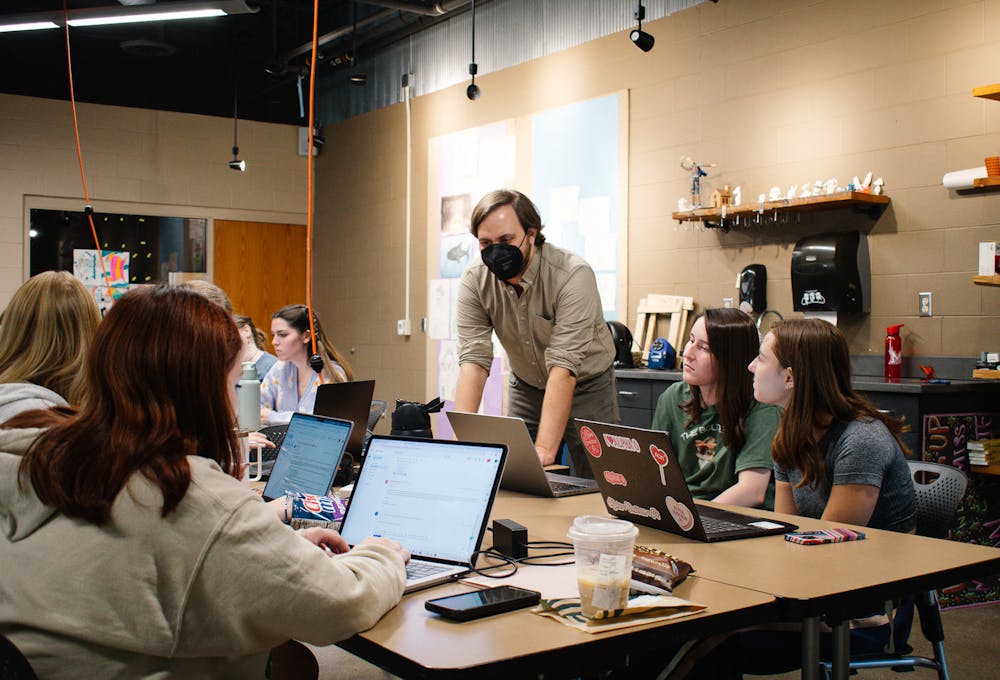Four years since COVID-19 upended daily life across the world, the conversation around the virus has shifted dramatically. Once at the forefront of nearly every discussion, COVID-19 seems to have settled in the background. Today, some people don’t take it as seriously as they once did.
Is COVID the new flu or does it still warrant precautions?
Mark Charlton-Perkins, assistant professor of biology at Miami University, said that while COVID-19 has similarities to the flu, it follows a different pattern.
“COVID seems to be cyclical and not necessarily seasonal,” Charlton-Perkins said.
While the flu and COVID-19 have differentiating qualities, such as the flu spreading more in winter as people are indoors, there are some similarities in how they are treated.
“I think that there are more instances of mild symptoms now compared to the initial phases of the pandemic,” Charlton-Perkins said.
Much of this can be attributed to increased vaccine availability. Charleton-Perkins said vaccines have decreased COVID-19 symptoms in many individuals.
Similar to the flu shot, COVID-19 vaccines are most influential in preventing and toning down symptoms. However, it’s not considered a seasonal shot that should be taken annually. Instead, boosters are available to those already vaccinated but are considered “high-risk” individuals.
Addy Fink, a junior psychology major and marketing minor, shared her experience after testing positive for COVID-19 for the second time and being partially vaccinated.
“The first time I had COVID, I had no symptoms,” Fink said. “So, when I got it again two weeks ago, I expected the same, but this time I had worse symptoms, but still flu-like.”
She said her personal, social and academic life took a toll during the illness. Isolating in her room for four days straight changed her daily routine. Fink completed all of her assignments from home, but said she didn’t notice any type of stigma around having COVID-19.
“Many others were getting COVID around this time,” Fink said, “and my roommates and professors understood there was nothing I could do.”
Enjoy what you're reading?
Signup for our newsletter
Isabelle Vegh, a junior strategic communications major and real estate minor, said she contracted COVID-19 the fall semester of her sophomore year as a fully vaccinated student.
“I think when the initial outbreak happened, I was more scared of it, just because there was so much that was unknown about it,” Vegh said.
She had cold-like symptoms with body aches, but never felt a large severity of the illness.
Charlton-Perkins said there are other infectious diseases and viruses that students should be aware of including measles because of declining vaccination rates.
On college campuses where students live and interact closely, the communal nature of campus life allows viruses to spread quickly. But that hasn’t stopped some people’s views on COVID-19 precautions from changing.
“I feel as though COVID is like any other illness,” Fink said. “I was unable to go to class but did not wear a mask as my roommates had already been exposed by the time I got tested.”
When Vegh contracted the virus,, she lived in a close-quartered dorm room with her roommate, who only came in to sleep at night.
“My roommate was very nervous about being in the room with me,” Vegh said.
Now, about a year later, Vegh said her viewpoints on the virus haven’t changed too much because of her minimal symptoms.
Fink added that COVID-19 should be handled with simple precautions, like rest and hygiene, but no longer needs additional measures such as mask-wearing or isolation.
Similarly, Charlton-Perkins said health organizations, like the Centers for Disease Control and Prevention, now have a balanced approach to managing COVID-19.
“In my opinion, they’re doing the right thing,” Charlton-Perkins said. “I don’t feel like we can continue to do really extreme isolation, but it is still important that the people that have … risk factors associated with COVID … are vaccinated appropriately.”
Vegh agrees that we currently do not need further isolation unless someone has tested positive with the virus.
“I don’t think it's anything where you should really be pausing life and what you’re doing out of fear,” she said about current CDC regulations. “I think you can still pretty much go about your daily lives.”
There is also a broader recognition of how COVID-19 shaped societal attitudes toward public health. Charlton-Perkins said one of the most important things we’ve learned as a society is the importance of hygiene, vaccinations and hand washing.
“Also, [there is] this level of consideration of other people when we are ill,” Charlton-Perkins said. “You know, before COVID, people would go to work when they had a cold. … People [definitely] think a little bit more about that nowadays, prior to the pandemic starting.”
While COVID-19 may feel like the new flu for some, the virus serves as a reminder of the importance of maintaining healthy habits.




